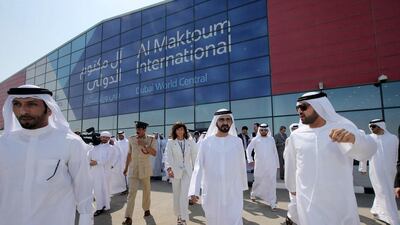The first passenger flight arrived yesterday at Al Maktoum International Airport, marking a milestone in Dubai's plan to create the world's largest airport.
The Hungarian budget carrier Wizz Air commenced operations at Al Maktoum with a flight from Budapest, inaugurating the airport’s passenger terminal.
The airport was scheduled to open in March 2011 but that was delayed twice.
Al Maktoum "will play a vital role in the future development of Dubai as a centre for trade, commerce, transport and logistics and tourism", said Sheikh Ahmed bin Saeed Al Maktoum, the president of the Dubai Civil Aviation Authority and the chairman of Dubai Airports.
“I am impressed by the efficiency and convenience of this new terminal.”
The new airport is viewed as vital to helping Dubai sustain its economic growth.
By 2020, the aviation sector will account for 32 per cent of the emirate’s GDP and 22 per cent of employment, according to the consultancy Oxford Economics’ research in 2011.
Dubai International Airport is the world’s second-busiest in terms of passengers and number three for cargo traffic. But Al Maktoum will gradually become Dubai’s primary airport as its sister facility reaches full annual capacity, exceeding 100 million passengers by 2018.
Located 40 kilometres south of Dubai, Al Maktoum will eventually be able to accommodate up to 160 million passengers a year and 12 million tonnes of freight. Its initial capacity will be 7 million passengers a year.
To date, three airlines have committed to flying there.
Wizz Air will offer non-stop operations between Dubai and Hungary. Jazeera Airways will follow with two weekly flights from Thursday.
Last week, the Bahrain-based Gulf Air announced it would start daily operations between Al Maktoum and Bahrain from December 8.
Dubai Airports says it is in discussions with several other carriers about having landing slots at the new airport.
Emirates Airline, Dubai Airports' main customer and the carrier that Sheikh Ahmed chairs, has yet to announce any plans to operate there.
“The location, convenience and compact nature of [Al Maktoum] are compelling attributes,” said Paul Griffiths, the chief executive of Dubai Airports. “Airline and customer interest in this airport continues to grow and we hope to announce additional services in the near future.”
The airport has one runway capable of carrying the widebody Airbus A380 aircraft and 64 remote aircraft stands. It will eventually have five runways.
The facility is part of the larger 140 square kilometre Dubai World Central, a development involving a cluster of multi-industry businesses surrounding the airport.
Mr Griffiths said this month the airport authority would consider shutting Dubai International if running the two airports restricted the take-up of flights at Al Maktoum, which has been running cargo operations since June 2010.
tarnold@thenational.ae

